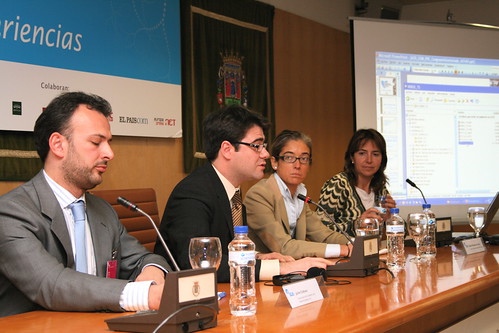
This is a post that I'm very sad to be writing, since as people may know, the whole thrust of my blog hearkens back to the unbearable sense of optimism I had working in Russia after the breakup of the Soviet Union. Something in the air in Russia in those days just fit me like a glove, and I've called my blog
The Beginning of Spring in honor both of one of my favorite writers,
Penelope Fitzgerald, and that feeling in the air.
This post is about the curtain coming down again. And I don't mean the geopolitical iron curtain that Chuchill was talking
about, although that, too, may come. I'm talking about the curtain on Russian souls.
Anna Politkovskaya was one of the bravest journalists working in Russia until this past week, when she was gunned down by someone who by all accounts carried out his job like a professional. There's a good
article about the political context for her murder by Anne Applebaum in
Slate, as does the
New York Times.
But beyond the fact of the murder, which I'm heartbroken about because there's one less person in Russia ready to oppose the slow slide back to national self-censorship, I'm sick over the fact that only 1000 mourners showed up for her funeral, and that almost all there were middle aged or older, and that Putin and others in the government are now going around claiming that this was a provocation by ill-wishers to make the Russian government look bad. The LA Times captures it
here. Most people don't even know what a loaded word "provocation" is--it probably just sounds like delusional thinking, I suspect, but it rings sadly oh so familiar to us ex-Sovietologists. This is just the kind of thing that the Soviet press told their citizens about any happening, any statement, any fact that was inconvenient and didn't fit the pre-masticated view of the world they presented to their citizens.
The sad thing is, when I
was, in fact, a Sovietologist in the 80s and 90s, I thought that the Russian people just didn't have a chance to know any better, and that if they had access to real information, the Government's lies would be seen for what they are. The fact of Soviet oppression of its people was depressing then, but the even more depressing conclusion I'm coming to is that perhaps I was wrong about the people. There are a couple of sobering
posts on this in Global Voices; it's not even that people are disputing who was responsible (the Chechens, the Government, various ill-wishers of Russia) but that so few people seem to be stepping back to realize that whether they agreed with Anna or not, events like this, and official reactions like this, bode well for the continued existence of an independent civil society in Russia. That the only posters who seem to realize this are expatriates is even more sobering still.
 I fell behind in my blogging to record my frustration that so many of the first canned obituaries for Boris Yeltsin that were trotted out subtly underplayed his contributions to a free press and a free political process in Russia ... and found myself overtaken by Mstislav Rostropovich's death.
I fell behind in my blogging to record my frustration that so many of the first canned obituaries for Boris Yeltsin that were trotted out subtly underplayed his contributions to a free press and a free political process in Russia ... and found myself overtaken by Mstislav Rostropovich's death.





